Virtu.us
Here It Is
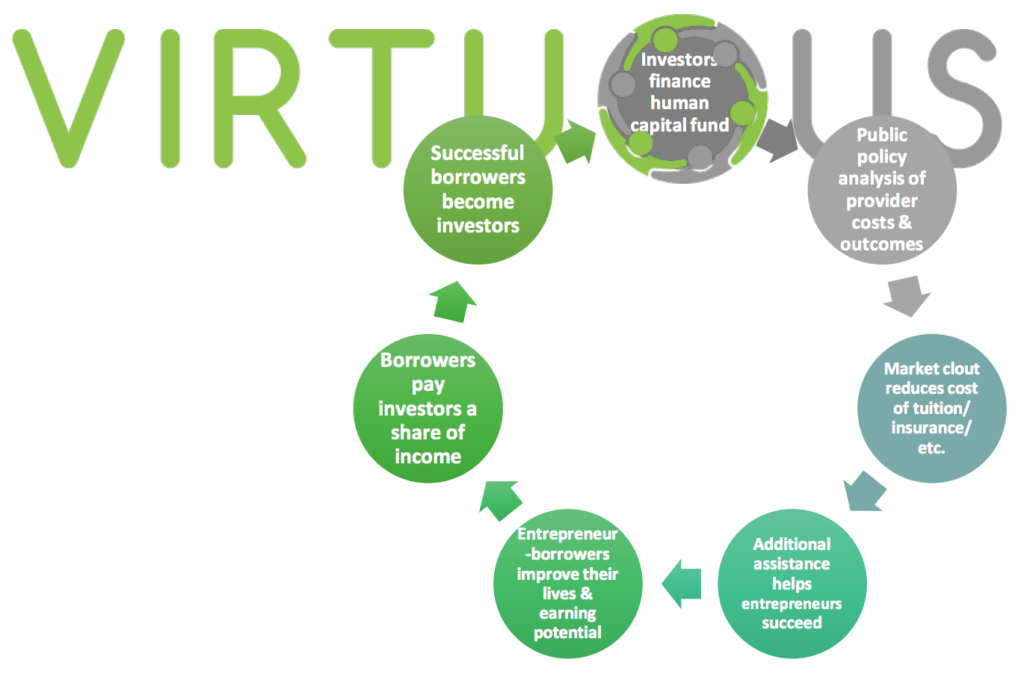 I’ve been promising for several months to give you the details of the idea I’ve been working on the last three years – the business model for what’s going to replace government as we’ve known it for at least the last 2,500 years. Sorry that’s taken me so long … but: Here it is!
I’ve been promising for several months to give you the details of the idea I’ve been working on the last three years – the business model for what’s going to replace government as we’ve known it for at least the last 2,500 years. Sorry that’s taken me so long … but: Here it is!
As I discussed previously, the origins of this idea lay in what I’ve been writing and teaching the last several years about “The Future of Government”: that modern technologies like the Internet, the platform business model, and blockchain, by moving us increasingly into a virtual world where distance, mass and geography matter less and less, are undermining the traditional national state. The question then becomes what replaces nation-states – an issue at the heart of the current worldwide political struggles between globalists and nationalists – and, in particular, What happens to so-called “public goods”?
In economic jargon, “public goods” are non-rivalrous and non-excludable – in other words, my consumption doesn’t deplete the amount available for you, and I can’t “own” it and keep you from using it. Public goods include much that we’ve come to expect governments to provide, such as public safety, public health, social insurance, education – things that create broader benefits for society as a whole, and from which everyone benefits. “Public goods” thus ultimately form the rationale for government itself. What happens to them in a society where technology increasingly allows resources to escape the territorial clutches of governments more easily than ever, and allows us all to opt-out of obligations we don’t want?
 I think they die – unless we can develop a method to capture (or “monetize”) their benefits and share them back to all (and only those) who choose to subsidize them. In other words, we need a profit-making model for public goods. Fortunately, the same technologies weakening nation-states today make possible the formation of voluntary, virtual communities.
I think they die – unless we can develop a method to capture (or “monetize”) their benefits and share them back to all (and only those) who choose to subsidize them. In other words, we need a profit-making model for public goods. Fortunately, the same technologies weakening nation-states today make possible the formation of voluntary, virtual communities.
Investments in “human capital” – education, health care, child development, social insurance – aren’t just liberal, feel-good things: They pay measureable economic “dividends.” For example, the average lifetime earnings of an African-American single mother go up by a half-million dollars if she has five-years of day care for her kids. A child’s lifetime income goes up by $6,000 (in present value) for every year that child has a good, instead of simply a mediocre, classroom teacher. These returns not only pay for the social investment – they’d turn a healthy profit for anyone financing them in place of the government.
Closing the Circle
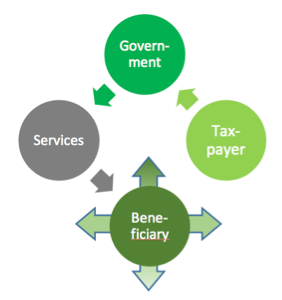
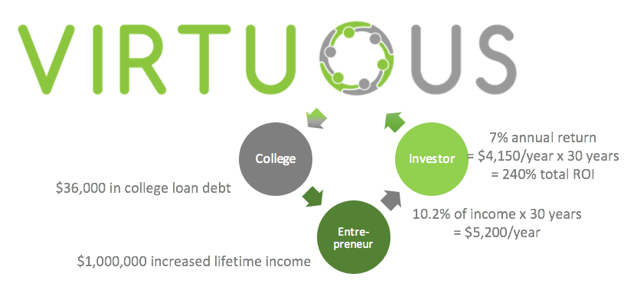
This is easiest to see in the commonly-understood example of return on higher education. Above are two illustrations I frequently use: The way things are today, taxpayers pay for government-provided services that (hopefully) improve people’s lives – but the benefits don’t necessarily accrue observably to the taxpayer. But if we treat beneficiaries as entrepreneurs, in whom we make an investment and then reap a percentage of the “profits,” the increased income alone would pay a healthy rate of return.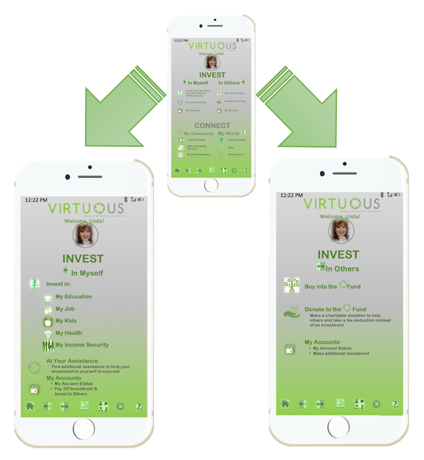
Such “income share agreements” already exist in higher ed; my new business, Virtu.us, aims not only to expand their presence but also to bring this concept to financing job training, high-quality child care, various forms of social insurance, and even provision of the kind of K-12 schools every child needs and deserves. All through an easy-to-use app and web portal.
But the concept doesn’t stop there. As the graphic at top illustrates, this model will incorporate policy analysis insights as to “what works” into market assessments of how best to invest in individuals; use the market clout of a growing community-of-interest to drive down the price of these services for everyone; and even expand over time into a wider potential range of “public goods” encompassing, well, virtually all current government activities. Eventually, this becomes a fully-fledged, on-line community – providing the things people want, but decreasingly find today, in real-life communities, let alone the on-line kind.
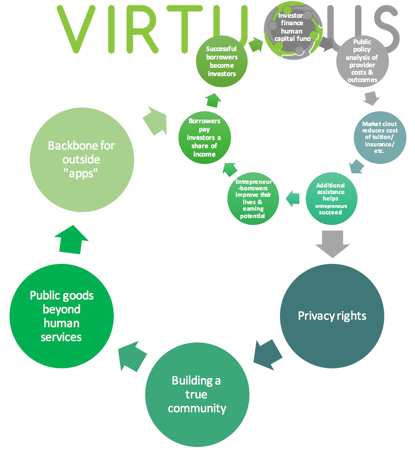 Perhaps you think the idea of private “governments” is terrible. Perhaps it is – but as public institutions as we know them decay, a new alternative will be needed for a very different future. Perhaps you think everything going on today will pass in another two years (or two weeks); perhaps it will – but the economic, political and technological phenomena driving public disinvestment have been going on for the last 40 years, and are occurring today everywhere across the globe. As you know if you’ve been following what I write for the last, oh, decade or so, the need for a new model of public-goods investment – and social progress – isn’t a passing Trump phenomenon: It’s the defining political challenge of our time. Virtu.us is my attempt at an answer.
Perhaps you think the idea of private “governments” is terrible. Perhaps it is – but as public institutions as we know them decay, a new alternative will be needed for a very different future. Perhaps you think everything going on today will pass in another two years (or two weeks); perhaps it will – but the economic, political and technological phenomena driving public disinvestment have been going on for the last 40 years, and are occurring today everywhere across the globe. As you know if you’ve been following what I write for the last, oh, decade or so, the need for a new model of public-goods investment – and social progress – isn’t a passing Trump phenomenon: It’s the defining political challenge of our time. Virtu.us is my attempt at an answer.
If you want to know more, there’s a 60-page white paper online at ericschnurer.com/virtuous: Please read it – I really want your comments and feedback! If you’d like to do more, let me know: We need programmers and project managers, futurists and finance whizzes, analysts and actuaries, marketers and MBAs. One way or another … we need you!
Quick Links:
Also, the last issue left out the link to my recent article about the collapse of the center: http://www.aspeninstitute.it/aspenia-online/article/two-americas-and-lost-center.
Coming next:
An analysis of the 2016 midterms
The role of policy in campaigns
How we helped to strengthen one of the poorest school systems in America
Takeaways from my new course at Brown University on poverty and the future
Again, I welcome your thoughts in the comments below!






